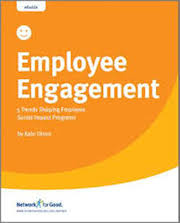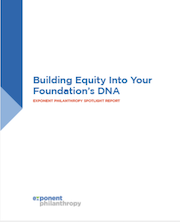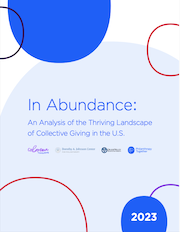Site Search
- resource provided by the Forum Network Knowledgebase.
Search Tip: Search with " " to find exact matches.
What does an age-integrated society look like and how can funders be part of the movement to strengthen aging initiatives in the philanthropic sector? Join this special conversation with Lindsay Goldman, CEO of Grantmakers In Aging, a community of funders mobilizing money and ideas to strengthen policies, programs, and resources for all of us as we age. Lindsay will share insights on how aging intersects with funding priorities including health, caregiving, social connection, and housing.
Lindsay Goldman serves as the Chief Executive Officer of Grantmakers In Aging (GIA), a position she assumed in January 2021. She draws on nearly 20 years of experience in program development and administration, direct service, philanthropy, and health and social policy. Most recently, Lindsay was the founding director of the Center for Healthy Aging at The New York Academy of Medicine. Specializing in public-private partnerships to create age-inclusive environments, Lindsay oversaw a portfolio that included the award-winning Age-friendly NYC, Health & Age Across All Policies NYS, and IMAGE: The Interactive Map of Aging. Earlier in her career, Lindsay was responsible for strategic planning and allocations to support older adults in New York and Israel while working for the UJA-Federation of New York. She also directed the Health Enhancement Partnership at Lenox Hill Neighborhood House and received a Best Practice Award from the National Council on Aging in 2008. She began her career at Big Brothers Big Sisters of NYC, where she coordinated an intergenerational mentoring program in the Bronx. She holds a BA from Wesleyan University and an MSW from NYU.
Emily Hinsey is the Director of Programs. In her capacity, Emily coordinates the programmatic work of the organization, including the webinar series, member meetings, funder networks on housing, serious illness, caregiving, technology, rural health, and multisector plans for aging, and grant-funded projects. Prior to beginning her work with GIA in 2017, Emily was the Administrator and Project Development Manager at Aging & In-Home Services of Northeast Indiana, where she advised on the organization’s accreditation and new business development. Emily began her career as the Prevention Coordinator at the Open Arms Domestic Violence Center. Emily serves on the Fort Wayne Mayor's Age-Friendly Council. Emily holds a BA in Social Work from Bluffton University.
This program is open to all interested attendees.
A brief guide for funders on how to partner with faith-inspired grantees with clear boundaries and integrity. It is designed for both funders new to the space, and those who would like to improve their working relationships with current faith-inspired grantees. We hope that this guide might provide new tools to funders and encourage them to consider more faith-inspired organizations as potential partners.
Responding to the urgency of this moment in time, Asset Funder Network’s new brief is reimagining and building on past recommendations to map more just paths to economic resilience moving forward.
To bring the framework and recommendations to life, they included eight case stories from local and national funders that are applying an equity lens with a range of strategies to support Relief through Resilience. Four of the funders have employed a two-pronged approach of investing in systems change and programs. Three others are focused on on-the-ground interventions, and another is predominantly investing at the systems level. To support their strategies, they have made changes inward, outward, around, and onward.
70 years after Brown vs. The Board of Education, segregation and resource inequities continue in New Jersey schools. Discussion will center on the lawsuit brought by 9 families with a coalition of civil rights, faith, and social justice groups. Meet Dr. Charles Payne, Director, The Cornwall Center for Metropolitan Studies Rutgers; Dr. Jesselly De La Cruz of Latino Action Network Foundation; Vivian Fraser of Urban League of Essex County; Jared Hunter with Salvation and Social Justice; and Brandon McKoy of The Fund for New Jersey.
New Jersey boasts one of the top education systems in the U.S. but our public schools are also among the nation’s top 6 or 7 most segregated. We see substantial differences in resources afforded across our 620 districts aligned with home rule. This results in significant harm in outcomes for students in segregated districts, including the 63% of all Black and Latino students who attend schools segregated by race and poverty.
Panelists: Dr. Jeselly De La Cruz, Executive Director at Latino Action Network Foundation; Vivian Cox Fraser, CEO of Urban League of Essex County; Dr. Charles Payne, Director, The Cornwall Center for Metropolitan Studies, Rutgers University; Jared Hunter, Organizing Director with Salvation and Social Justice; Brandon McKoy, President, The Fund for New Jersey
Cost: Free for CNJG Members, $50 for Non Member Grantmakers.
Webinar Video
Cornwall Research Finding Summary: The Latinx Experience in NJ Schools: A Preliminary Overview
Dr. De La Cruz referenced article from Chalkbeat: New Jersey school segregation case: A look at key points, what’s next in Latino Action Network vs. NJ

Employee engagement through cause is a vital means by which to strengthen employee relationships, enhance employee morale and even build critical skill sets and expertise. Plus, employees are hungry for ways to get involved in cause. Not sure how to integrate cause into your company’s employee engagement strategy? Network for Good is here to help.
A new wave of efforts designed to break the cycle of poverty and revitalize distressed communities is attracting attention and support from every segment of society. Prominent among these efforts are six emerging national networks: Building Sustainable Communities, Choice Neighborhoods, Promise Neighborhoods, Purpose Built Communities, Strive, and The Integration Initiative.

Funders are being asked to show how they are addressing social inequities by specifying what they do and who they are. How does philanthropy begin to embed equity into grantmaking, policies, and culture?
Healthy Communities Foundation has been on a journey to address this question by advancing health equity through a racial equity lens. This report describes that journey and offers practical ways of inspiring action so you can integrate equity into your foundation’s DNA.
This report explores how companies are integrating diversity and inclusion into their corporate citizenship and responsibility priorities. With support from the Walmart Foundation, CECP led a year-long inquiry to identify and share actionable insights and best practices that corporate leaders can learn from and apply in their own companies. The report identifies six key D&I trends, as well as case studies, latest knowledge, methods, and valuable insights.
The Council of New Jersey Grantmakers is pleased to release our annual look back at the Council’s robust programming, leadership initiatives and advocacy efforts. From funder briefings to our Signature events to providing New Jersey’s philanthropic sector with integral connections and services – CNJG is an engaged and cohesive network of grantmakers dedicated to our state’s communities and people.
The Council of New Jersey Grantmakers is pleased to release our annual look back at the Council’s robust programming, leadership initiatives and advocacy efforts. From funder briefings to our Signature events to providing New Jersey’s philanthropic sector with integral connections and services – CNJG is an engaged and cohesive network of grantmakers dedicated to our state’s communities and people.
When Mayor Ras Baraka took office in 2014, he immediately called for an expansion of the city’s Summer Youth Employment Program.
There is a growing body of evidence that youth employment programs are a positive intervention that can reduce summer violence and incarceration and improve educational outcomes of participating youth. Just as important, they help to expose youth to career pathways early, allowing the city to integrate youth into an overall workforce development strategy. For Mayor Baraka, the call was personal — he participated in the program as a youth and remembers fondly the impact it had on his life.

In Abundance: An Analysis of the Thriving Landscape of Collective Giving in the U.S. explores the transformative impact of collective giving on philanthropy. Practiced in cultures all around the world, collective giving brings people together to pool their resources, including time, talent, treasure, testimony, and ties — often referred to as the 5Ts. Groups like giving circles, SVP chapters, giving projects, and nonprofit-led circles have long served as democratic and philanthropic learning hubs — bringing historically marginalized voices into philanthropic decision-making spaces, challenging preconceived notions of who is considered a philanthropist, and elevating members as integral actors in our sector’s efforts to advance diversity, equity, and inclusion in giving.
A partnership between the Johnson Center, Colmena-Consulting, and Philanthropy Together, this report underscores collective giving groups’ role in reshaping philanthropic practices, fostering social connections, and amplifying the voices of marginalized communities.
Snapshot: Trends and Strategies to Engage Employees in Greater Giving is the third edition in a series of reports developed by America's Charities since 2000.
Key findings include:
- The evolution of the current employee giving model continues toward aligned, branded initiatives that offer charitable choice and that are integrated with other employee engagement activities.
- Companies recognize the benefits – employer, employee, and community – of a strong giving program.
- Digital culture is driving many of the changes in employee giving.
- “Workplace giving” is evolving a full spectrum of employee engagement initiatives.
- Companies are creating a new giving model to attract younger employees and to ensure their programs remain relevant and vibrant.
The New Jersey Historic Trust, an affiliate of the New Jersey Department of Community Affairs (DCA), today approved a total of $16,598,738 in grant recommendations from the Preserve New Jersey Historic Preservation Fund to save and promote historic sites throughout the state. Seventy-five preservation planning, municipal, county, and regional planning, heritage tourism, and capital projects are included in this year’s list of recommendations.
“Historic preservation is an integral part of community and economic revitalization and I am excited to see a diverse list of grant recipients this year,” said DCA Commissioner Jacquelyn A. Suárez. “From historic homes, farms, schoolhouses, and churches to train stations, lighthouses, and villages, the work that will be accomplished with the preservation grants will help to secure the future of our most treasured historic places in the Garden State.”
Rising Tide Capital (RTC), a prominent New Jersey-based entrepreneurship training organization, has received a transformative three-year, $1.5 million grant from the Geraldine R. Dodge Foundation to catalyze the nonprofit’s programmatic expansion in Trenton and throughout New Jersey. This award, approved by the Foundation’s Board of Trustees, will provide $500,000 annually to advance RTC’s impactful entrepreneurship education and workforce development initiatives catering to historically marginalized communities.
The Dodge Foundation’s strategic investment will bolster entrepreneurship education centered on high-opportunity licensed, credentialed, and certified career pathways. It will also provide comprehensive one-on-one technical assistance, resilience coaching, and tailored business support to entrepreneurs. Furthermore, the grant will fund strategic innovation projects that integrate RTC’s established programs with statewide partners, thereby significantly expanding the reach and accessibility of services to underserved communities throughout New Jersey.
CNJG is pleased to offer this program to family foundation members as part of NCFP's Fundamentals of Family Philanthropy 2023 webinar series, providing guidance on the core tenets of effective family philanthropy.
A family philanthropy has a much better chance of success if there is an intentional culture that values continuous improvement, feedback and professional development, and an integrated approach of learning and assessment across governance, philanthropic strategy, succession, and more. The assessment process asks organizations to evaluate their philanthropic purpose, governance, team, accountability, finances, and family—to answer how you can continually keep people engaged and excited about this work, and improve on what already exists. This webinar will explore how board and staff can create a learning culture within the philanthropy, different tools to assess the organization internally, and strategies to build assessment and feedback into all facets of the work.
Cost: This event is free for CNJG Members who are family foundations.
Other types of foundations are ineligible to join this webinar.
This program is a CNJG membership benefit for family foundation members, including staff and trustees, in partnership with the National Center for Family Philanthropy.
- The American Express Foundation diversified strategies to build non-profit management skills in its effort to develop diverse talents in the non-profit sector. Some of these efforts include a leadership development program that supports emerging talents from various ethnicities, generations and genders.
- The Baltimore Community Foundation took the first step to educate and inform the foundation internally before sharing its DEI efforts with the community. A shared understanding among internal stakeholders helped align their goals around DEI which made integrating DEI work in the foundation and the community much more effective.
- Access Strategies Fund increased civic participation of diverse communities through equitable grantmaking driven by diverse decision makers and saw dramatic increases in political representation among communities of color.
- The Silicon Valley Community Foundation believes that data can drive equity and publishes data on its website regarding the gender and racial / ethnic diversity of its staff and leadership, and lists the grants it provides to organizations or programs serving ethnically diverse populations.
In our most recent round of funding, the Dodge Foundation made more than $5 million in grants which served to acknowledge long-standing partners and collaborators, support new partners who are driving racial equity and justice, and respond to the real-time issues and crises facing people across the State of New Jersey. These grants represent our purposeful efforts to support and recognize the impact of years-long partners and institutions, while also strengthening and growing our support to new organizations focused and aligned to our new strategic direction of building a just and equitable New Jersey.
The Dodge Foundation provided multi-year funding to support a number of partner organizations, representing a collaborative strategy of providing the space, time, and opportunity for each organization to strengthen and build their capacity and encourage new voices and funding partners to join the movement. The goal of this support is to achieve long-term sustainability that allows these organizations to continue their impact well into the future. As the Foundation continues our transformation to center racial equity and justice in our work and our funding, we are also thrilled to recognize these long-standing partner organizations and the impact they have had and will continue to have on communities across New Jersey.
In this funding cycle, we provided three organizations each with a three-year grant of $1M general operating support. For all of these initiatives, the Dodge Foundation was a core partner from the earliest days and an integral supporter in achieving years of state-wide impact.
New Jersey Community Capital, the state’s largest community development financial institution, announced Tuesday that it has donated a total of $50,000 to the municipalities of Newark, Paterson, Camden, Trenton and New Brunswick.
Each of the five municipalities will receive $10,000 in funding for specific community organizations or initiatives focused on economic development, youth programs, public health and more. The donation is part of NJCC’s commitment to this year’s Martin Luther King Jr. Day celebration theme: “It starts with me: cultivating a beloved community mindset to transform unjust systems.” NJCC CEO Bernel Hall said the organization feels the donations will have great impact.
In honor of the life, legacy and impact of Dr. Martin Luther King Jr. and Coretta Scott King, New Jersey Community Capital invites you to join it in furthering NJCC’s mission of promoting equitable opportunities for all.
“We’re thrilled to be able to build on Dr. King’s mission and integrate it into our work throughout New Jersey and support such well-deserving community organizations and impactful programming,” he said. “These cities are doing crucial work to make New Jersey the best it can be, and partnering with them to do even more will provide better outcomes and opportunities for residents.” Hall said NJCC’s charitable giving corresponds to its work across the state to finance the predevelopment, acquisition, construction, rehabilitation and mini-permanent needs of affordable housing units for ownership and rental opportunities. NJCC’s lending takes a holistic and equitable approach by financing projects that use the diverse pillars of a community, including small businesses, commercial office and retail spaces and early childhood education centers.
Public policy is a vital aspect of the work of many of New Jersey's grantmaking organizations and is an integral component of CNJG's programs and member services. CNJG's Policy Committee advise and assist CNJG in identifying issues for potential action.
In late 2023, CNJG’s Board of Trustees approved our first-ever Policy Agenda. The Policy Agenda aligns with CNJG’s 2023-2027 Strategic Plan, specifically Goal #3, Amplify Our Collective Voice. This agenda includes our approach to the work, followed by five policy priorities. Read or download the agenda.
Resource Websites
- United Philanthropy Forum Public Policy Focus
- Center for Non-Profits: Public Policy
- Council on Foundations’ Public-Philanthropic Partnership Initiative
- Council on Foundations’ Advocacy Resources
- Independent Sector: Policy and Advocacy
To learn more about what CNJG is doing to foster deeper relationships between New Jersey grantmakers and public and elected officials in Trenton and Washington, D.C., contact Theresa Jacks.
